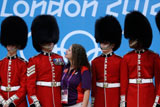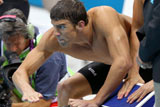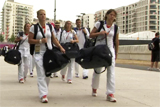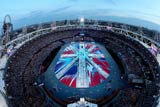EU gives Greek and Olypmic waters all clear
Updated: 2012-05-24 13:05:57
(Agencies)
|
|||||||||||
BRUSSELS - Indebted Greeks and nervous Olympians could draw some relief from the latest European Union bathing report.
It finds the waters of Greece, so crucial to much-needed tourist revenues, are among the most pristine in Europe and confirms London's Serpentine Lake, where Olympic triathletes will swim in competition, is clean enough to swim in.
Overall, 92.1 percent of EU bathing waters meet minimum water quality standards, but some nations, including the EU's home Belgium, have work to do.
Other challenges for the future include coping with extreme weather, such as flooding, which can suddenly make water unsafe.
"We wanted to show how even inland water in the middle of Central London is now clean after all the efforts countries have put in," Jacqueline McGlade, executive director of the European Environment Agency, said.
"But the challenge going further is adaptation to big fluctuations," she added, citing flooding in Copenhagen last year and in 2010. Sewage then flowed into bathing water, raising the risk of stomach complaints for anyone who swam in it.
Nitrates from fertilisers and levels of pharmaceuticals in water are also an issue, McGlade said.
Apart from Belgium, countries with relatively few sites conforming to the standards of the Bathing Water Directive were Bulgaria, Latvia, Luxembourg and the Netherlands. Mc Glade said agricultural waste was in part to blame.
Some five percent of Belgian sites were non-complying or poor and 9.1 percent banned or closed, while in the Netherlands 10.1 percent were non-complying or poor and 0.3 percent banned or closed.
Luxembourg did not have any non-compliant sites, but 45 percent of its bathing waters were banned or closed.
Clean Mediterranean
At the other end of the scale, with more than 90 percent of sites meeting the most stringent standards, were Cyprus, Croatia and Malta, as well as Greece.
The Commission, the EU's executive arm, and member states have been working for years to combat problems caused by industrial waste-water and sewage.
Since 1990, the number of coastal bathing waters not complying fell from 9.2 percent to 1.5 percent in 2011.
Over the same period, the number of inland bathing areas not complying decreased from 11.9 percent to 2.4 percent.
Apart from the headline figure of 92.1 percent of all sites now meeting at least minimum standards, the report found 77.1 percent were of excellent quality in 2011 - that is, complying with the toughest standards, an improvement of 3.5 percentage points on the previous year's data.
The share of non-compliant bathing waters, at 1.8 percent, also rose very slightly year-on-year - showing a 0.1 percentage point increase from 2010.
Initial EU legislation was adopted in 1975 and revised when the bloc adopted a new bathing water law in 2006, with a more pro-active approach, to bring the public into the debate.
Each year, EU body the European Environment Agency and the Commission publish a report based on laboratory analysis of bacteria, which can indicate the presence of pollution, chiefly from sewage or livestock waste.
In addition to EU waters, it assessed sites in Croatia, Montenegro and Switzerland.
In all, more than 22,000 bathing sites were classified as compliant with mandatory values, compliant with the toughest guidelines or not compliant.
Medal Count |
||||
| 1 | 46 | 29 | 29 | |
| 2 | 38 | 27 | 22 | |
| 3 | 29 | 17 | 19 | |
| 4 | 24 | 25 | 33 | |
| 5 | 13 | 8 | 7 | |
| 6 | 11 | 19 | 14 | |
















